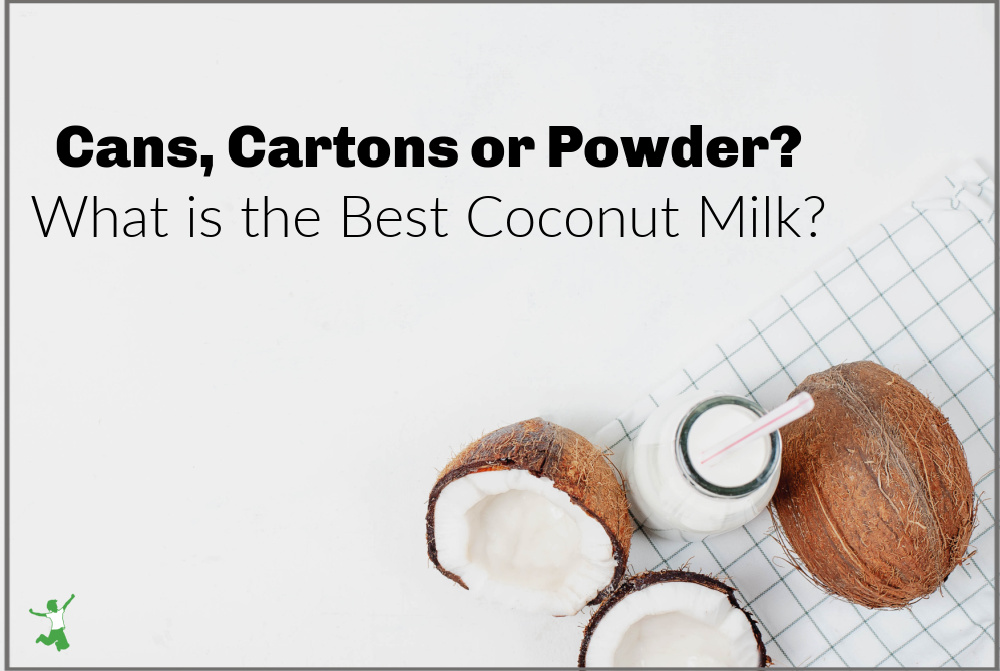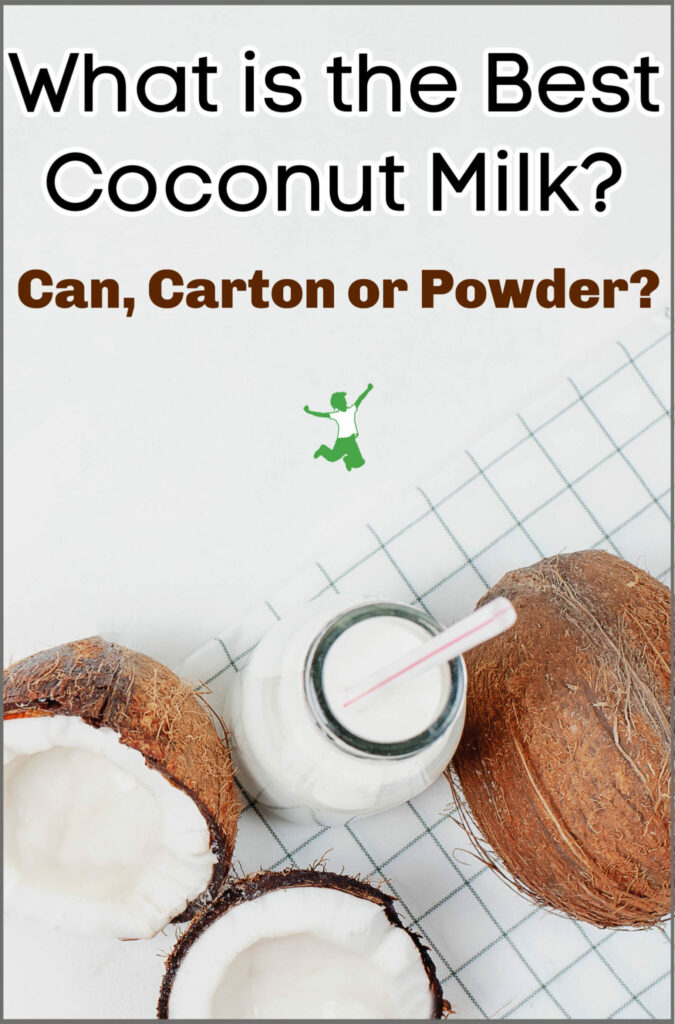Examination of the types of commercial coconut milk (cartons, cans and powder) and which is best for health and storage purposes.

When it comes to coconut milk, there are several kinds available to buy at the store or online.
Cartons and cans are the most readily available especially at the supermarket.
However, powdered coconut milk is increasing in popularity and becoming widely available too.
Consider Freshly Made First
Before examining each of these commercial coconut milk options in detail, let me first suggest considering making it yourself.
Many people do not realize how easy and fast this is to do!
All that is necessary to make a quick batch of homemade whole coconut milk is to procure a package of frozen, shredded coconut meat from your local Asian supermarket.
This video of me shopping at an Asian supermarket and what I typically buy shows what to look for.
You don’t have to procure whole coconuts, crack them open with a hammer and scrape out the meat.
Simply add some plain young coconut water (this is a good brand) to a package of the frozen meat (use filtered water in a pinch), blend in a food processor to desired consistency, and you are done!
Commercial Coconut Milk Options
If making your own coconut milk isn’t an option or you need to add it to your emergency pantry supplies, then freshly made is clearly not the way to go.
In that situation, canned, shelf-stable cartons or powdered coconut milk are needed.
Which of these storage forms of coconut milk is the best and healthiest?
Should you have a mix of the three on hand?
Let’s take a look.
Whole Only!
When it comes to commercial coconut milk, it is important to only buy the whole form.
Lowfat coconut milk is a waste of money and has very little nutritional value.
The fat in coconut milk is almost all saturated with anti-microbial lauric acid as the primary fatty acid.
This lipid is the healthiest medium chain triglyceride and usually absent (or significantly reduced) in MCT oil brands.
It is used for energy and is not typically stored by the body.
If you think saturated fat from coconuts is bad for health, consider that traditional cultures such as the Polynesians who ate coconuts for centuries as a staple food had virtually no heart disease.
All their health issues started after the introduction of the “displacing foods of modern commerce”. These included evaporated dairy milk, refined sugar, and white flour.
This is verifiable via in-depth text and photos in the anthropological classic Nutrition and Physical Degeneration written early in the last century by Dr. Weston A. Price.
Canned Coconut Milk
Canned coconut milk is an excellent choice for storage. Here are the pros and cons to consider before choosing this type for your family.
One word of warning.
Be sure your preferred brands of coconut milk cans aren’t watered down (many companies pull this stunt!)
Pros
Canned coconut milk is extremely convenient. Simply open the can and use immediately.
No heating or mixing is required.
Cans also offer the benefit of long shelf life, typically a year or two.
This is the primary reason I always keep roughly a half dozen cans in my pantry. This is the brand I buy that contains no guar gum.
Cans are also very affordable per ounce even if you buy organic.
Is it necessary to pay extra for organic? Not really, although it is always ideal if you can support organic farming.
Coconut palms are not a high spray or GMO crop, so you are not risking chemical exposure if you opt for non-organic.
Cons
Non-organic coconut milk tends to have more additives than organic, which usually just has one … guar gum (except for this organic brand which does not have any additives).
Note that nonorganic coconut milk usually has preservatives like potassium metabisulfite. Anyone with sensitivities to sulfites or who are prone to headaches should avoid this undesirable ingredient.
Canned coconut milk also has the potential for endocrine disruption even when using non-BPA cans.
This is because the thin lining of the cans even if BPA-free is usually made from cousin chemicals such as BPS which carries the same risks.
Thus, it is best to only use cans for storage purposes and opt for freshly made for regular use.
Coconut Milk Powder
Powdered coconut milk is a popular option for storage purposes. Below are the pluses and minuses. This is an excellent brand to consider.
Pros
Coconut milk powder eliminates the issue of endocrine disruption as the packaging process does not include chemicals like BPA or BPS.
It is also not denatured, unlike dairy milk powder which is allergenic. This is because coconut milk has virtually no protein that gets damaged during the powdering process.
Coconut milk powder also has the longest shelf stability and takes up the least amount of storage space.
My two cents…it is still usable and safe even after the expiry date on the package.
Cons
If the power is out, coconut milk powder is not as easily usable as cans or cartons.
This is because you need to mix it with hot water to re-hydrate into coconut milk.
Every brand of coconut milk powder I’ve examined also contains maltodextrin.
While organic brands contain nonGMO forms of this additive, maltodextrin is a polysaccharide and produced from vegetable starch.
Hence, it is best avoided by those on a gut healing diet like GAPS or the Specific Carbohydrate Diet.
Shelf Stable Coconut Milk Cartons
Coconut milk in shelf-stable cartons is perhaps the most popular form of commercial brands.
As a general rule, I recommend against buying this type of coconut milk for any reason.
First of all, it is inefficient for storage purposes as it takes up a lot more space than cans or bags of powdered coconut milk.
Secondly, coconut milk in cartons has numerous undesirable ingredients.
Synthetic vitamins include Vitamin D2 (from irradiated yeast), folic acid and Vitamin A.
Supplemental calcium is also a common ingredient, which contributes to heart attacks and is not healthy to consume.
Additives such as gut inflaming carrageenan and xanthan gum are also present in a number of popular brands I reviewed.
In fact, all the brands I looked at…even the unfortified organic ones…contained the sketchy “natural flavors”.
This manufacturer catch-all could literally mean anything from flavorings from glands in a beaver’s backside to those tested on aborted fetal cells. Not even kidding.
“Natural flavors” is the smokescreen ingredient for anything food manufacturers do not want consumers to know about.
Then, of course, is the very serious question of packaging.
The standard method for packaging in tetrapak-style cartons is to fill the plastic-lined containers with boiling hot liquid. This sterilizes the container for the longest possible shelf life before sealing.
This industry standard factory process introduces the very real possibility for endocrine disrupting chemicals leaching into the coconut milk itself.
What Kind to Choose?
In summary, while there are three primary forms of commercial coconut milk on the market, it is quite straightforward to identify which are the best.
An important point to remember is that there is literally nothing about coconut milk cartons that can be considered beneficial. Everything about it from the manufacturing, to the ingredients and packaging is unhealthy and best avoided.
So, when considering how to use or store commercial coconut milk if you don’t intend to make it fresh yourself (optimal), use canned or powdered only!









This year Trader Joe changed the formulation of its coconut milk and it now has 11 grams of fat, while Natural Grocers has 14 grams. NG costs a little more than TJ. I like the price of TJ and will sometimes add a tablespoon of coconut oil to the TJ milk when making a curry.
Thanks for sharing. In these inflationary times, checking the label will become more important than ever, as some companies will cheapen their products to hold the line as much as possible on price increases….which Trader Joe’s appears to have done with its coconut milk 🙁
what about bpa and bps lining the cans of the azure standard, trader joes, and native forest?
can you recommend quantities of water and shredded coconut when making fresh?
Yes, that is an issue. There is no perfect solution for cans or powder although they are better than tetrapaks (cartons).
Making it yourself fresh is best, but then, that doesn’t store so well in a pantry for power outages and such.
What I use is one cup water (or plain coconut water) to one cup of shredded coconut meat. Blend in a food processor until smooth.
Check the consistency of the mixture. If it is too thin for your liking, add a bit more shredded coconut and blend again until smooth.
Pour coconut meat/coconut water mixture into a juicer to quickly strain out the coconut fiber. What is left is raw, whole coconut milk!
I really look forward to your knowledgable articles. However, this article disappoints. First you say that canned coconut milk is no good because of additives. There are several brands of canned coconut milk (mostly organic) that are literally just coconut milk and water. Native Forest, Trader Joe’s, and Arroy-D come to immediate mind. Then you say that people are at risk for endocrine disruption even with non BPA cans. Yet, earlier in the article you recommend and have a link to coconut water in a non BPA can.
Finally, while I am aware that you could not possibly have researched every single brand of coconut milk on the market, I find it important to mention that Thai Kitchen brand carries a box of (non organic) coconut milk that has only coconut and water. I have found this coconut milk at Target in the section of Asian foods. The wording on the front of the box is Thai Kitchen 2 Simple Ingredients. The box is 25 ounces. Which is why boxed coconut milk takes up more space. The boxes have more product than the cans.
Hi Nancy, sorry if my line of writing was confusing. First, the Thai Kitchen brand is in a tetrapak carton and not a good idea to use as outlined in the article. While the cans are not optimal even without any gums, they are better than cartons. It is always best to make fresh. No option is 100% good except for making it yourself. Just trying to cover all the caveats so you can make your own decisions about what to do for your storage needs. Hope that is clearer!
We regularly use coconut in our cooking being from India and your method for extracting coconut milk is exactly as it is done here. Coconut here is grated free and stored in deep freeze and can be used as is in garnishes and for porridges we generally grind it further in a moxie and add directly. Only for specific curries and sweets do we extract milk
Thanks for sharing your method!
I like the “Natural Value” brand of canned coconut milk. No guar gum, and a very large a amount of coconut cream. I buy it by the case from Azure Standard and use it instead of commercial dairy milk.
Wow, that’s great! Thanks for the tip! I will have to order some with my next Azure order.
Trader Joe’s doesn’t have any gums and Native Forest has one called “simple” because it also doesn’t have gums. Trader Joe’s is less than $2 per can and is organic.